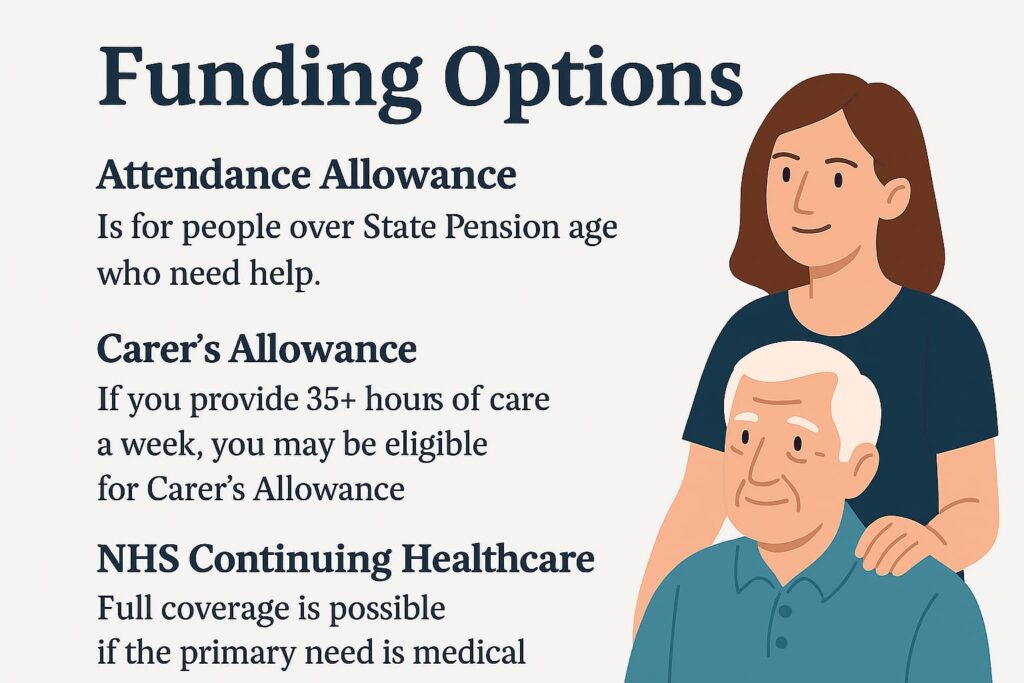You’ve made the hardest decision — accepting that your loved one might need extra care. But understanding how funding home care in the UK works doesn’t have to add more stress. You’ve made the hardest decision — accepting that your loved one might need extra care.
But as soon as you breathe that in, the next worry lands on your chest like a brick:
“How are we going to afford this?”
This question isn’t just financial — it’s emotional.
It’s about guilt, responsibility, and fear.
It’s about wanting to do what’s right when nothing feels right.
So let’s talk about funding care — not with pressure or jargon, but with warmth, clarity, and dignity.
Because you deserve to understand your options without shame or confusion.
Why Understanding Home Care Funding in the UK Matters
The UK system isn’t simple — we won’t pretend it is.
Funding options for home care include benefits, local authority support, and NHS routes.
The trick isn’t just knowing they exist, but knowing how to access them before you reach crisis point.
That’s what this guide is for.
To help you make decisions calmly — without panicking about cost.
This guide will give you a clear, compassionate insight into what funding home care in the UK really looks like — beyond the jargon, and without the overwhelm.
1. Attendance Allowance – Often Overlooked, Always Valuable
If your loved one is over State Pension age and needs help due to illness, including dementia, they may qualify for Attendance Allowance.
This benefit is not means-tested, so savings and income don’t disqualify you.
It provides:
£72.65/week (lower rate) if care is needed during the day or night
£108.55/week (higher rate) if care is needed day and night
It’s money to help make life easier — whether you use it for home carers, extra equipment, or simply more peace of mind.
2. Carer’s Allowance – Recognising Family Caregivers
If you care for someone 35+ hours a week, you may be eligible for Carer’s Allowance.
£81.90/week (2024–25 rate)
You can still work part-time (earning under £151/week)
It’s not just about the money.
It’s about honouring the care you give — often invisibly — every day.
This allowance also opens doors to other benefits and discounts.
3. Local Authority Funding – It Starts With an Assessment
You can request a free care needs assessment through your local council. This looks at:
What kind of help your loved one needs
Whether they qualify for support
this will give you an insight on what funding home care in the uk may look like
If they pass the needs test, a financial assessment follows.
Some families are surprised to find their parent does qualify — even if they own a home, especially when care is provided at home.

4. NHS Continuing Healthcare – Full Funding for Medical Needs
If your loved one’s main needs are medical, they may qualify for NHS Continuing Healthcare (CHC) — which pays for all care, including at home.
It’s not means-tested
Assessed via checklist and full review
Can cover complex dementia care, even if not hospital-based
Ask the GP or hospital to begin the CHC checklist assessment.
It can be hard to qualify, but worth pursuing — we’ve seen families fully relieved of financial burden through this route.
5. Hidden Help – Don’t Miss These Low-Visibility Benefits
Sometimes the most helpful support isn’t shouted about.
Here are other benefits worth checking:
Council Tax Reduction – If your loved one has ‘severe mental impairment’ (like dementia), you may apply for a tax discount or full exemption.
Blue Badge Parking – Available even for non-physically disabled dementia patients.
Cold Weather Payments – Extra winter payments to help cover heating costs.
Carer Premium – Extra money added to other benefits like Universal Credit or Pension Credit.
They might not seem like much on their own — but together, they make a difference.
Breathe – This Doesn’t Make You Weak
Asking for help with funding doesn’t mean you’ve failed.
It means you’re wise enough to plan.
This isn’t about cutting corners — it’s about giving your loved one dignity while preserving your own emotional, physical, and financial health.
You are not alone.
And you don’t have to be the expert — you just have to reach out.
Need to Talk It Through?
At Everest Care, we help families understand care, funding, and the emotional weight of these decisions.
We’re not financial advisors — but we know how to explain things simply, and we’ll always listen first.
📞 Reach out for a calm conversation.
Or explore our Home Care Services.
You don’t have to carry this alone.


